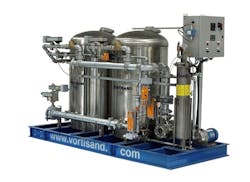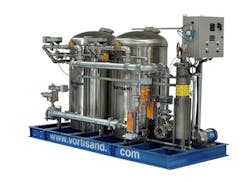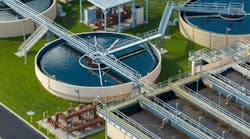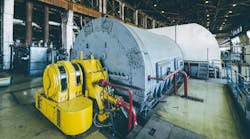Nov. 18, 2014
The Mandarin Oriental, located in Washington D.C., is a five-star luxury hotel with more than 400 rooms, an award-winning restaurant and other amenities reminiscent of the finest hospitality traditions of the Far East. The Mandarin's D.C. location and top-drawer service offering has helped earned the hotel an international reputation for high quality. A sampling of recent guests include the iconic sixties rock band, the Rolling Stones, U.S. presidential hopeful, Barack Obama and many other media celebrities and political dignitaries from around the world.
Not long ago, the hotel was confronted with a major cooling tower sludge problem. Massive amounts of the slurry were detected in the chiller tubes and 12-inch system feeder pipe. The filtering apparatus online proved ineffective at combating the problem, prompting management to seek out expert consultation.
Team Effort
Patrick Payne of Boland Trane teamed up with Denny Alexander of Armstrong Filtration, a provider of cost-effective filtration solutions based in Winchester, Va., to conduct a scientific examination of the hotel's cooling water system. Both companies have been bringing innovative products and services to their clients since the early 1960s.
"We collected water samples from the hotel's cooling water system and forwarded them to an independent laboratory for laser particle distribution testing. This lab analysis determines the micron size dispersion and dirt load concentration per each micron size from 100 to 0.45 sub-micron range," said Alexander. The results were quite revealing. Roughly 95 percent of the particles were under 20 microns. The findings narrowed the field, as far as filtration solutions went. Many types of filtration systems previously considered were automatically ruled out. The only one that met all the criterion we were looking for turned out to be the Sonitec's Vortisand® filter."
The Next Generation
Vortisand is a successful concept years ahead of its time. One might even call it the next generation of sand filtration systems. Once solid materials are centrifugally directed to a filter tank's outer radius, they are sent on their way via a self-activating backwash. This advanced approach to filtration facilitates the use of extremely fine media capable of capturing particles as small as 0.45 microns. Run-of-the-mill filters simply can't compete, as near-microscopic solids can slip right through them like minnows through a fishnet. This is due in large part to the not-so-fine media conventional systems must employ, as very fine media can prove as much a clogging agent as the solids it is intended to trap. The unique operational scheme employed by Vortisand renders this potential problem no problem at all.
"The Vortisand filtration system traps suspended solids on top of the media bed and not back into the condenser water loop. The really great thing about the Vortisand is its ability to self-monitor sand cleanliness and self-clean as needed," said Mandarin Oriental Director of Engineering David Tolson. "The moment we get a 10 to 12 PSI difference between incoming flow and outgoing, the Vortisand backwashes automatically. And because we have two filtration systems in operation simultaneously, one filter picks up the slack when the other is in backwash mode. It's a really smart concept."
ROI Right Now
According to Boland and Armstrong's energy analysis, the Mandarin had earned return on investment (ROI) within a 12-month period using the Vortisand filtration system. A water sampling taken shortly after installation corroborated this optimistic forecast, as it showed a 99-percent suspended solid reduction. Operational efficiency was much-enhanced as well, as the hotel's cooling tower now consumes much less in the way of electrical amperage and chemistry.
"The hotel doesn't consume nearly as much cooling tower chemistry now because the Vortisand has made the water much cleaner," said Mandarin Oriental Group Energy Manager, Kevin Sharp. "We're now realizing a roughly 45-percent savings on chemistry verses the amount we spent, pre-installment. Water usage has gone down substantially."
Numbers don't lie. According to Sharp, cooling tower water usage for January 2007 was 1,057,000 gallons. A year later, it was a mere 900,000 gallons, and by February 2008, it was a little more than 100,000 gallons less than that. March saw a big drop as well, as have all months that have followed since the Vortisand came on board.
"At the moment, we're using roughly half the water we used a year ago and probably several years before that," Sharp said. "We've gained a very hefty savings, and it's doubtful we'd have done that well without the Vortisand."
Salvaging Efficiency
One of the biggest paybacks earned by Mandarin via the Vortisand installation has been a huge increase in cooling tower operational efficiency. According to Tolson, the hotel's original filtration system used cyclonic separators to dissolve solids into microns. The system was problematic efficiency-wise, as the filtering process pulled water away from the tower, reducing the cooling effect.
"We wound up sacrificing 5 percent of our efficiency to our old cooling system. The cyclone channeled water away from the system, put it through a filter and then returned it," said Tolson. "And the cyclone still didn't filter very well. Vortisand has efficiency built into its design. A filter pump replaces filtered cooling water on a simultaneous basis, stealing away none of the cooling effect.
“When Boland/Armstrong conducted their initial testing, the system showed something like 0.45 micron solids present. That figure went down to 0.1 micron once the Vortisand was installed (which in terms of water cleanliness is nearly crystal-clear)," he said. "When clean water goes to the chiller, heat transfer doesn't have to be negated, and you get 98- to 99-percent efficiency. So the upshot here it that you don't lose efficiency with Vortisand -- you gain."
See also:
"Case Study: Filter reduces flood-induced suspended solids in New Orleans heat exchangers"
About Sonitec
Sonitec was founded in 1986 offering an innovative technology: the Vortisand. Behind each Vortisand system you will find a dedicated company with more than 2,500 installations worldwide. Certain innovations have allowed the company to become a specialist in filtration for pharmaceutical, petroleum refining, biotechnology, pulp & paper, automotive, and general HVAC sectors. Recent breakthrough installations include Vortisand filters on cooling systems of major projects operated by major market leaders such as eBay, Conoco-Philips, GM and more. For more information, visit www.sonitec.com/en/home.html.
###



